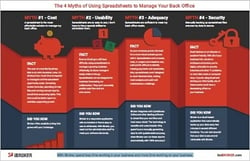| Let’s use a spreadsheet program, like Excel, as an example and apply the opportunity cost formula:
Opportunity Cost =
what you are sacrificing / what you are gaining
Some may determine the following:
| GAINING |
SACRIFICING |
| Stability |
Data accuracy |
| Familiarity |
Precious time |
| Low cost software licence |
Historical data & insight |
| Extensive online support |
Data security |
| |
Scalability |
| |
Contingency |
| |
Share-ability |
Consider:
Data Accuracy. A Harvard Economics Study found that 88% of spreadsheets contain some type of error. Simply misplacing a decimal point can result in significant accounting errors. Excel’s primary functionality is NOT accounting. Spreadsheets are a medium to contain your data but don't allow for in-depth data analysis. Trying to identify and fix these errors can be a resource hog.
Time. The inability for Excel to integrate with other systems can result in time-consuming double entry and result in errors. Processing financial statements in Excel can take up valuable time. With online software, you can collect your data and generate a financial analysis report, a sales report, or a commisssion statement, in just a few clicks - a far more efficient process. While it’s fairly simple to create spreadsheets in Excel, making it a functioning accounting program requires skills that most users don't have, and recruiting talent that has that skillset can be expensive.
Security. With all of your business information stored on staff computers, you could be highly vulnerable to security breaches. In the event of a hard disk crash, computer virus, or deliberate tampering, your data is at risk. If you’re using a spreadsheet program and storing your data locally, any of these events could potentially have a devastating impact on your business.
Historical Data & Insight. Spreadsheets don’t allow you to maintain a reliable audit trail. They aren’t designed to store historical data, so often, in an attempt to keep the size of files manageable, they are updated and companies lose important historical information. This makes critical trend analysis a challenge. Further, data and formulas can be changed or accidentally deleted, without any trace of the original entry.
Contingency. If you have one person dedicated to managing these files, as is the case with many SMBs, and this person leaves your organization, the intel and knowledge goes with him/her. This leaves you at a disadvantage when hiring a replacement and trying to mitigate business disruption. As your business grows, the need for a more robust, comprehensive and integrated solution grows with it. Invest in a solution now that can scale with your business to mitigate the need to transition later.
Share-ability. Do you have filenames like this in your business: Year1-11Financials_AB_gh_final_9.31.17_final2_FINAL_jh.xls When collaborating with colleagues, numerous revisions often result in a mess like this. The inability to make live updates to spreadsheets requires the documents to be passed around with each person making a change or addition. It is certainly not an efficient or effecitve process to say the least.
In summary, some may conclude that the sacrifices are greater than the gains in this example. Spreadsheet programs may not in fact be a time or money-saver as often believed, but rather, they may be costing your business lost opportunities. | 



